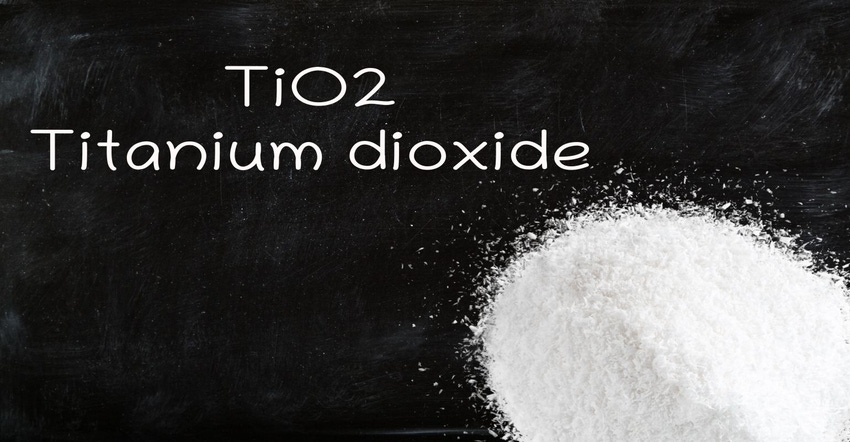
A bill in California that would ban five food and color additives, including titanium dioxide, has been met with opposition by trade groups who argue it subverts federal regulatory oversight.
Recently passed by the California General Assembly, AB-418 would prohibit the manufacturing and sale of food products containing brominated vegetable oil, potassium bromate, propylparaben, red dye3 and titanium dioxide.
The bill would take effect in January 2025. Those who violate the above prohibitions would be subject to a civil penalty of $5,000 for a first violation and up to $10,000 for each subsequent violation, based on an action brought by the California Attorney General, a city attorney, a county counsel, or a district attorney.
On May 24, the bill was referred to the Senate committees on Health and Environmental Quality.
The bill’s supporters contend the chemicals are linked to such serious health risks as increased risk of cancer and harm to the reproductive system and immune system, according to a General Assembly floor analysis of AB-418.
“But because of the FDA’s inaction and regulatory loopholes, these chemicals are found in many food products, such as snacks, candy and soda consumed by children in California and the United States,” the analysis adds.
‘State-by-state patchwork approach’
Food and dietary supplement groups have argued the bill represents a patchwork approach to regulating additives and undermines the federal regulatory system for overseeing them.
“Making and providing food that is safe for consumers is our industry’s top priority,” Sarah Gallo, vice president of product policy with the Consumer Brands Association, said. “Our companies follow rigorous safety standards and comply with regulations set by the FDA as well as the state. Unfortunately, this bill seeks to upend this existing and comprehensive science-based approval system for food and color additives.”
Christopher Gindlesperger, senior vice president of public affairs and communications with the National Confectioners Association, suggested the bill “is well-intentioned, but this is not the right way to do it.”
“We should be relying on the science-based rigor of the federal regulatory process and avoiding a state-by-state patchwork approach related to food additives and ingredients,” he added.
FDA oversight of additives
All five of the substances subject to AB-418 have undergone FDA review, and based on the Federal Food, Drug & Cosmetic Act, “ingredients added to food must be safe under their intended conditions of use, and safety information must be available to establish a reasonable certainty of no harm before they are used in products on the market,” an FDA spokesperson said.
For instance, she said FD&C Red No. 3 (red dye) is subject to two color additive regulations, one for food and another for ingested drugs. FDA also regulates titanium dioxide as a color additive and has adopted regulations for titanium dioxide for use in cosmetics, drugs, food and medical devices.
In addition, FDA is reviewing a petition that proposes the agency repeal the color additive regulation that provides for use of titanium dioxide in food. The petition was filed in March by the Environmental Defense Fund, Center for Food Safety, Center for Science in the Public Interest (CSPI) and Environmental Working Group.
CSPI says titanium dioxide can be found in such foods as chewing gum, chocolate, coffee creamers, dressings, frosting, hard-shelled candies, puddings and sauces. It’s also added to pills to make them white, according to ConsumerLab.com.
Titanium dioxide controversy
According to the petition, FDA hasn’t reviewed the safety of synthetic titanium dioxide in a half-century. In 2021, the Panel on Food Additives and Flavorings of the European Food Safety Authority concluded the substance “can no longer be considered as safe when used as a food additive.”
“It found that although gastrointestinal absorption of synthetic TiO2 is low, the nanoparticles that are absorbed may accumulate in the body, and that accumulation may be linked to adverse effects such as immunotoxicity and inflammation and neurotoxicity,” the petition stated. “It could not rule out genotoxicity.”
An FDA spokesperson, however, said other international regulatory bodies—including the United Kingdom’s Food Standards Agency, Health Canada and FSANZ—have not agreed with the European Union’s assessment.
“The FDA notes that EFSA’s 2021 opinion continued to confirm no general and organ toxicity, as well as no effects on reproductive and developmental toxicity,” she added. “In its 2021 opinion, EFSA noted that it could not rule out genotoxicity and included genotoxicity tests on titanium dioxide nanomaterials. Some of the genotoxicity tests included test materials not representative of the color additive, and some tests included administration routes not relevant to human dietary exposure.”
FDA should be involved in any review of titanium dioxide, according to Steve Mister, president and CEO of the Council for Responsible Nutrition.
“With regard to titanium dioxide, we are concerned when any state second-guesses the $7.2 [billion] federal agency specifically tasked by law with ensuring the food and drug supply of this country is safe,” he said. “Doing so only confuses consumers and industry and creates precedent for more of these state-level exceptions. Any evaluation of titanium dioxide should include FDA, not exclude them.”
About the Author(s)
You May Also Like






.png?width=800&auto=webp&quality=80&disable=upscale)